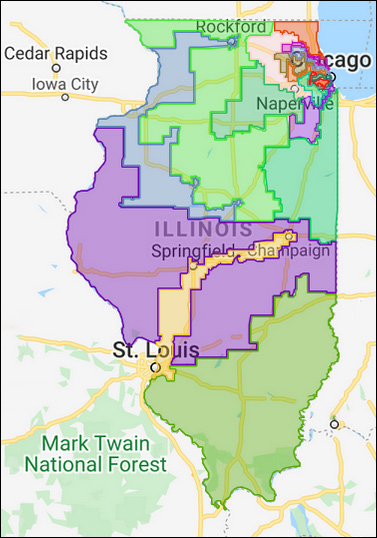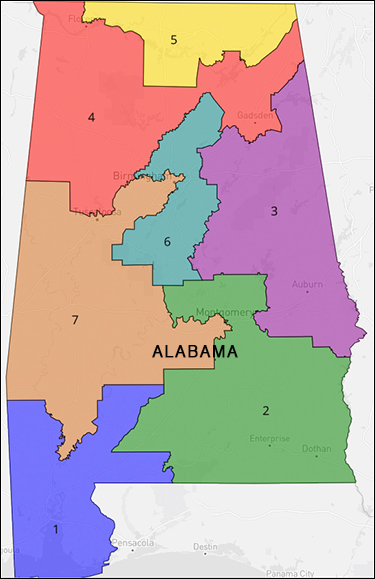By Jim Ellis
March 25, 2022 — Redistricting has largely been responsible for six sets of congressional pairings — that is where two incumbents are forced to compete against each other in one new district. Each party sees three intra-party pairings, with the first being decided in West Virginia on May 10.
New polling was released in the Mountain State contest, which features Reps. David McKinley (R-Wheeling) and Alex Mooney (R-Charles Town) battling in a new northern 2nd District. West Virginia lost its third district in national reapportionment, and even though the GOP controls the redistricting pen, the party obviously had to absorb the lost seat since all three current House members are Republicans.
Rep. Mooney, being in the middle district of the original three, always the least advantageous geographical position, had his district split between the northern and southern seat. All but one percent of Rep. McKinley’s current 1st District is contained in new District 2, while just 49 percent of Rep. Mooney’s current 2nd carries over to the new 2nd. All of Rep. Carol Miller’s (R-Huntington) current 3rd District is fully contained within the new 1st as well as 51 percent of Rep. Mooney’s current WV-2.
Two early 2022 surveys, in January from Public Opinion Strategies and February from WPA Intelligence, found similar leads of 45-32 percent and 43-28 percent for Rep. Mooney. This week, however, the West Virginia Chamber of Commerce released their North Star Opinion Research survey (March 13-15; 400 WV-2 likely voters) and their results found Rep. McKinley rebounding to record a 38-33 percent edge. With polling showing a tightening of the race, we can expect a close finish in what should be regarded as a toss-up campaign.
Georgia
The Georgia Democrat pairing between Reps. Carolyn Bourdeaux (D-Suwanee) and Lucy McBath (D-Marietta) in the new Atlanta suburban 7th CD looks to be leaning toward the latter woman even though she sees a very low constituent carryover factor from her current 6th District.
This race will likely be decided on May 24, but since Georgia is a runoff state, there is always the mathematical possibility that the minor candidates could force a secondary election because their combined vote could be enough to keep both major contenders from reaching the 50 percent plateau.
An early January Data for Progress survey found Rep. McBath holding a nine point lead, 40-31 percent, despite the fact that only 12 percent of the new 7th comes from Rep. McBath’s 6th, as compared to 57 percent of the new population base who currently live in Rep. Bourdeaux’s district. On the other hand, McBath is much stronger with the regional Democratic base voter than is Bourdeaux.
Michigan
Two other paired contests are even tighter. Though the Michigan Democratic pairing between Reps. Haley Stevens (D-Rochester Hills) and Andy Levin (D-Bloomfield Township) won’t be decided until the Aug. 2 Democratic primary, two recently released surveys already detect a dead heat.
Lake Research Partners released data from their Feb. 15-20 survey that found the two Democratic members tied with 36 percent support apiece. Earlier in the month, Target Insyght found an almost identical conclusion from their ballot test question, with Reps. Stevens and Levin tied at 41 percent. In January, Impact Research released their study that posted Rep. Stevens to a seven-point advantage, 42-35 percent.
In this situation, Rep. Stevens sees a 45 percent carryover factor from her current 11th District, while Rep. Levin will have only 25 percent of his current 9th District constituency in the new 11th.
In Congressman Levin’s favor, however, is home base status. The Bloomfield Township region, which provided the base vote for his father, Sander Levin, whose career in the House lasted 36 years, and his uncle, the late Sen. Carl Levin who served his own 36 years in Congress, is fully intact within the new 11th. Conversely, Stevens’ home precincts within the Rochester Hills area are not included in the new 11th. This likely gives Levin the advantage of having the more driven supporters, which matters greatly in a lower turnout primary election.
Illinois
Turning to Illinois, in a race that will be settled in the June 28 primary, Reps. Sean Casten (D-Downers Grove) and freshman Marie Newman (D-La Grange) also appear locked in a tight battle for political survival in the western Chicago suburbs. Unlike all the other paired districts that are safe for the winning paired member, the IL-6 CD could become a general election battleground.
In the new 6th, Rep. Newman sees more of her constituents comprising the new district, as just over 41 percent of her current 3rd District voters will be present in the new 6th. This number compares favorably to Rep. Casten’s constituent carryover factor of just 23.5 percent coming from the current 6th. Like in the aforementioned Michigan pairing, one member’s home base is within the district, in this case Casten’s, while the other, Newman’s La Grange region, is not.
Also, as in two of the other pairings, we see an early cycle even split between the two candidates. According to a Victoria Research Feb. 10-15 survey, the two House members were tied at 37 percent apiece.
No polling data is available for the other two pairings — the Illinois Republican battle between Reps. Rodney Davis (R-Taylorville) and Mary Miller (R-Oakland) in the new 15th CD, and Michigan Reps. Bill Huizenga (R-Holland) and Fred Upton (R-St. Joseph) in their state’s new District 4.
Davis has the advantage with the establishment Republicans while Rep. Miller, with former President Trump’s endorsement, is the ideological base vote favorite.
Despite running more than $200,000 in ads for the upcoming primary, Michigan Rep. Upton still says he has not yet committed to running again. He has until the April 19 candidate filing deadline to make a final decision. Upton has the geographical advantage in the new 4th (64 percent carryover to 25 percent), but Huizenga has the Trump endorsement and is stronger with the ideological base.
House redistribution statistics can be found on the Daily Kos Elections website.





